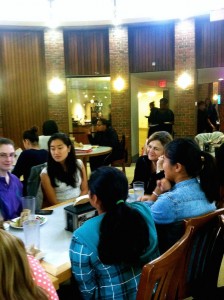As I wrote earlier this month, the broad question What does it mean to be a woman in the 21st Century? will serve as the theme for a number of important conversations this year.
This is an important moment for these conversations and I look forward to engaging students, faculty, staff, and alumnae in this broad theme and the many implications and subtopics that this theme provides—including, initially, the topic of gender fluidity and its implications for a women’s college.
As I wrote to our campus community today: Wellesley College was founded to educate women who will make a difference in the world. Wellesley’s founders recognized that the education of women would confer powerful benefits upon both society and individuals. They also recognized that women faced significant challenges—social, economic, cultural—in attaining an education.
Wellesley remains steadfast in its mission, investing its considerable resources to awaken the potential of individual women and to give them the tools they need to make a meaningful difference. Wellesley is likewise committed to maintaining a community of individuals who embrace the College’s mission of educating women.
That said, there is great diversity today in the ways individuals experience and express their gender identity. Gender fluidity has implications for women’s colleges in general and for Wellesley College in particular.
We recognize that the issues of gender identity and transgender experience are relevant and complex. We must build a better understanding of these issues and determine what current policies and practices might need revision in light of this understanding
To begin this conversation, I will be appointing an advisory committee. Composed of students, faculty, staff, and alumnae, the Committee will have the following charge:
- First: Inquiry. The Committee will determine and delineate the specific issues raised for a women’s college and our community at a time when gender fluidity is becoming increasingly acknowledged. To accomplish this goal, they will seek input from all members of the College community.
- Second: Education. Recognizing that different members of our community have varying levels of knowledge and understanding of this topic, the Committee will coordinate a year-long program of events and activities designed to bring all members of our community to a common baseline level of knowledge and understanding. The Committee will also facilitate opportunities for many voices to be heard, both on campus and among our alumnae.
- Third: Evaluation. Throughout the fall semester, the Committee will examine all relevant policies and practices on campus, will solicit input from key Wellesley constituencies and will determine whether and how they continue to serve the mission of the College in the context of new understandings about gender.
- Fourth: Findings. At the beginning of the spring semester, the committee will present its findings regarding policies or practices that are affected by the College’s evolving understanding of gender and their impact on Wellesley’s mission. These findings, and subsequent discussion of them by the College’s governance bodies/structures, will guide recommendations to be made to the Board of Trustees.
Advisory committee members will be selected in consultation with the appropriate governance structure (i.e., Agenda Committee for faculty, College Government for students, Administrative Council for staff, and the Alumnae Association). I want to thank those of you who have already reached out to me to express your interest in participating in these conversations in some way—I encourage others who are interested to do the same.
I likewise invite all members of the community to be engaged in this dialogue throughout the year, and I welcome your feedback on the charge to the advisory committee.
